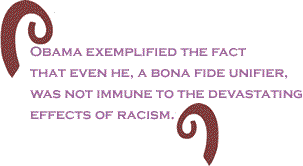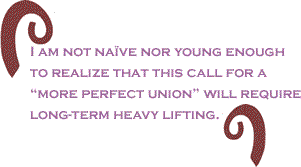
|
||||||||||||||||||||||
 |
||||||||||||||||||||||
 |
||||||||||||||||||||||
 |
||||||||||||||||||||||
 |
| The current issue is always free to everyone |
|
|
 |
 |
| Senator Barack Obama’s speech this past Tuesday moved me even from the printed page (I did not have access to TV to watch it live), and it made me think. He and the message did this for me: 1) His refusal to disown Rev. Jeremiah Wright, the man, but disdain some of his message, even while acknowledging its basis, showed a thoughtful and balanced analysis. Personally, I wish he had not even felt the need to condemn Wright’s words and done more to dissect the historical context from which Rev. Wright often derives his text, but perhaps that’s a totally different speech. 2) By bringing his own racial experience into the picture—which he simply had to do, although his campaign has tried to deftly keep him from “going there”—he exemplified the fact that even he, a bona fide unifier, was not immune to the devastating effects of racism. 3) Obama kept his campaign issues forward, an attempt, I think, to not let the sensationalism of the media’s smearing of Wright, and therefore, himself, distract him and his mission.
We have been battling (or ignoring) mightily the abject pain, repercussions and lack of willful solutions to the issue of race in this country, and its repugnant ripplings around the world, for centuries. I think Obama’s speech can be lifted up as a conduit for further discussion, and not just among the usual talking heads, but to people in every state, county, city, neighborhood and kitchen table in the country. Those of us who will need to do the real, on-the-ground work of reconciliation and understanding. I am not naïve nor young enough to realize that this call for a “more perfect union” will require long-term heavy lifting. But it begs the question: At what point do we—all of us—decide that we no longer have the luxuries of inconvenience and discomfort or the vehement burden of our own racial experiences to come to grips and truly heal? I say we don’t have too much longer. Nancy Harvin is an activist/organizer living in Washington, D.C. Click here to contact Ms. Harvin.
|
Your comments are always welcome. e-Mail
re-print notice
If you send us an e-Mail message we may publish all or part of it, unless you tell us it is not for publication. You may also request that we withhold your name. Thank you very much for your readership. |
|
| March 27, 2008 Issue 270 |
|
| Executive Editor: Bill Fletcher, Jr. |
| Publisher: Peter Gamble |
| Est. April 5, 2002 |
| Printer Friendly Version in resizeable plain text format format |
 |
 |
 |
| |
| |





























